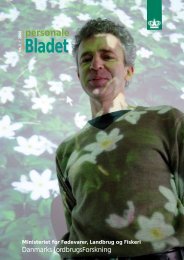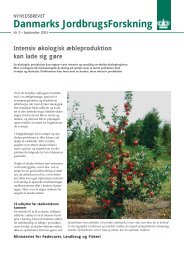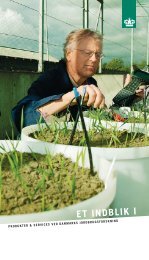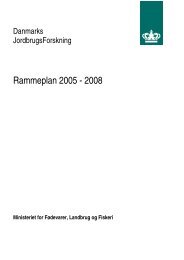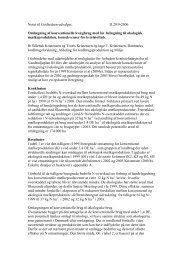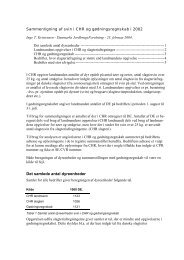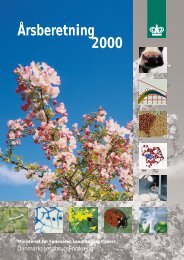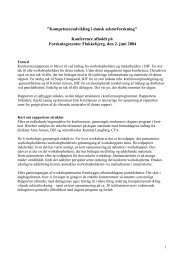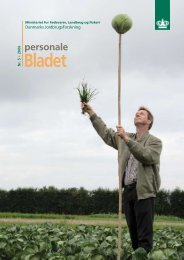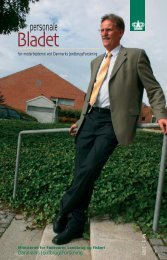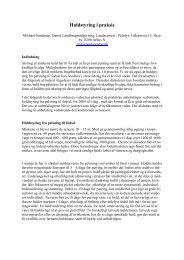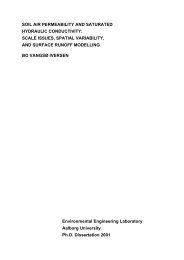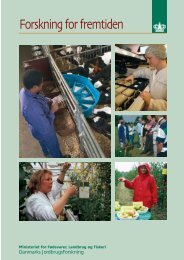Reproduction performances and conditions of group-housed non ...
Reproduction performances and conditions of group-housed non ...
Reproduction performances and conditions of group-housed non ...
Create successful ePaper yourself
Turn your PDF publications into a flip-book with our unique Google optimized e-Paper software.
- Outline <strong>of</strong> this thesis -<br />
OUTLINE OF THIS THESIS<br />
A basic knowledge <strong>of</strong> how <strong>group</strong> housing varies in practice is a prerequisite for identifying<br />
important causes for impaired reproduction performance in <strong>group</strong> <strong>housed</strong> <strong>non</strong>-lactating<br />
sows. A short introduction to <strong>group</strong> housing in practice is therefore provided in How does<br />
<strong>group</strong> housing vary in practice.<br />
With the aim to identify, which processes that may go wrong <strong>and</strong> why, a brief review <strong>of</strong> the<br />
literature <strong>of</strong> reproduction physiology was carried out. This review is presented in Appendix<br />
1.<br />
As discussed in Appendix 1, several studies have indicated that <strong>group</strong> housing may lead to<br />
individual variation in energy intake <strong>and</strong> increased stress. At the same time there are several<br />
indications that energy intake <strong>and</strong> stress may influence the reproduction physiology <strong>of</strong> the<br />
sow. Therefore, two review papers were written to consider whether individual variation in<br />
energy intake (paper I) as well as stress <strong>and</strong> fear (paper II) could be contributing reasons for<br />
the lower reproduction performance in <strong>group</strong> <strong>housed</strong> compared to individually <strong>housed</strong> sows<br />
found in some on-farm studies.<br />
Based on these two review papers it was concluded that there are indications that <strong>group</strong><br />
housing practice may lead to individual variation in energy intake, stress <strong>and</strong> fear which<br />
may influence reproduction performance negatively. However, traditional methods for assessing<br />
feed intake, stress <strong>and</strong> fear in sows are not suitable in large-scale on-farm studies or<br />
for the individual farmer, who wants to find out whether level <strong>of</strong> stress, fear <strong>and</strong> feed intake<br />
could be contributing reasons for reproduction problems in <strong>group</strong> <strong>housed</strong> sows. Therefore,<br />
a need for indicators <strong>of</strong> stress, fear <strong>and</strong> energy status suitable for use under practical <strong>conditions</strong><br />
was identified. It was possible to define such indicators based upon existing knowledge<br />
<strong>and</strong> these indicators are presented <strong>and</strong> discussed in paper II <strong>and</strong> paper III. However,<br />
whether these indicators are suitable to express variation in sows susceptibility for a good<br />
reproduction performance under practical <strong>conditions</strong> was not known. Therefore a study in<br />
14 herds with different layouts <strong>and</strong> management routines was carried out. The level, the<br />
between-farm <strong>and</strong> within-farm variation in indicators <strong>of</strong> feed intake, fear <strong>and</strong> stress from<br />
the 14 herds are presented <strong>and</strong> discussed in paper III. In paper IV the relation between the<br />
reproduction performance (e.g. litter size <strong>and</strong> pregnancy rate) <strong>and</strong> the indicators <strong>of</strong> feed<br />
intake, stress <strong>and</strong> fear are presented <strong>and</strong> discussed.<br />
In the General discussion, the results from the four papers are discussed <strong>and</strong> put into perspective.<br />
Finally, a general conclusion is put forward in Conclusions.<br />
13



